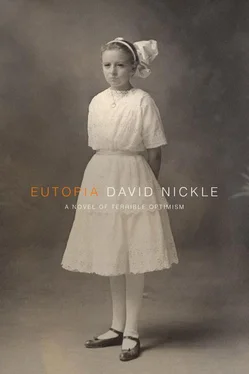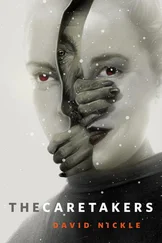Jason sneezed. His heart was hammering in his chest as he looked over to the girl, who now sat holding her knees to her chest. She was rocking back and forth.
He turned to her, to see if she was all right, but she hunched her shoulders closer in. He touched her shoulder, started to say something like, “You should get away from here ’fore that thing comes back,” but he couldn’t get out a word before she looked up at him, opened her mouth wide, and screamed.
The scream was like a slap across the face—the kind of slap that sometimes a fellow needs, to put him back on course.
He had helped this girl on a whim. But Ruth, who he’d met in the middle of the night and accompanied on this dangerous adventure across Eliada—who he’d kissed… she was gone.
“Ruth,” said Jason.
He hefted the axe and headed up over the little ridge.
“Ruth!”
He didn’t even take the time to see if there were any guards before he started across the open. Ruth was there—he could see her clearly, by the light of her newly lit lantern, at the edge of the building itself. And the door closed on her and that light before he was half the way across.
What was she thinking? She’d taken off, lighting up her lantern like she was walking back to her pa’s house and not that Devil-Infested quarantine. She stepped in through a door, leaving Jason outside to deal with that thing in the forest, help that poor girl. What a no-good—that was his first thought.
He didn’t keep it long in his head, though. Because about the time he was thinking back to his own dizzy time in the quarantine—when it had taken a cut to his hand so deep it still hadn’t healed to bring him back to himself—he thought how quick and easy it was to give yourself up to old Mister Juke, giving not a thought for anything other.
If that is what had happened to her—if she was following some wicked siren call from within—
—like mayhap he was himself. Jason took a sharp breath, and reminded himself of where he was: out in the open, in a yard where men wearing sheets were keeping guard. That thing he’d fought had coughed something in his face, and sure he’d fought it, but now wasn’t he walking into another kind of trap?
He figured he should maybe go back to cover, and thinking that chanced a glance over his shoulder.
The thought was enough to save him—he saw the first of the things mid-leap, before it had a chance to hit him.
This one was almost as big as he was, though skinnier by far. Its scarecrow body blacked out the sky as it jumped over him, scythe-claws spread. Jason ducked and slashed up with his hatchet. He felt the blade graze something and the thing landed a few feet beyond him—one hand clutched at Jason’s middle as it steadied itself.
Jason rushed at it and slashed out again, but this time the creature ducked to the side and it was all Jason could do to keep his feet beneath him. He didn’t get a third swing, because at that moment, something bit into his ankle. He looked down—a smaller creature, no bigger than a newborn, had latched onto his foot and was gnawing at his Achilles tendon. He didn’t let it get far, first kicking out then stomping down on his ankle. The thing squealed and dislodged, rolling back. Jason thought he could see things like porcupine quills roil across its back.
The big one had meantime recovered its wits, and slashed out at Jason’s back. Jason was expecting it, however, and whirled around with the axe at arm’s length. He caught it in the chest more by chance than anything else, then yanked the hatchet free and swung it again. This time it bit into the thing’s head—and as Jason pulled the blade out again, he drew the head close to his.
“God-damn you,” he swore as he looked it in the eye and saw the thing that it had become. His mama’s eyes rolled in sockets that looked like hers, and a black tongue emerged from between lips like hers. He swore again and pushed it to the ground, then kicked it hard with his bad foot even though that hurt like hell to do it.
“God-damn you!”
He turned back to the woods and raised the hatchet.
That was how they did it, these Jukes: they put the face of the thing you loved or wanted most at the top of your mind, and using some kind of magic put it on their own flesh. Or maybe just made you imagine it. Jason felt his eyes heat up with tears. And even if you know it can’t work—if you know it can’t be true—it doesn’t make it any less hurtful, to put an axe-blade in your dead mama’s skull.
Another of the things leaped out of the darkness at him, and Jason swung at it—too wide, and the thing latched onto his arm. The pain was bad enough that Jason’s hand opened without his meaning and the hatchet fell to the ground.
“Damn!” he shouted, and tried to yank the tiny Juke off his arm. It glared up at him with Aunt Germaine’s tiny, magnified eyes and held tighter. But if that was meant to make him pull his punch, it was the wrong trick. Jason punched it straight on the back, and it came undone like a leg trap.
But by then two other things had hit him in the legs, and there was nothing for it. Jason went over. The ground came up fast and he coughed away his wind, and then he felt another thing on his chest, while something else forced his fist open on his good arm and another thing, no bigger than a barn cat, jumped onto his groin and started scrabbling there, like it was trying to hook a claw into his belt.
And then there arrived one other—a big one, like the creature he thought he’d finished.
It had the girl’s face—a face covered in dirt, with pine needles in her hair—and that face leaned over him, to look in his own face. The creature had made those eyes wide and angry, and its lips curl back with a kind of mad hunger—and as a hand lowered over his mouth, and two fingers pinched his nose to cut off his air, and she said, “You the boy who drove the Baron from my bed.” It dawned on Jason then that this was no Juke at all.
This was the girl—and she was finishing the Juke’s work. He tried to pull away, but his strength was sapped. She leaned close to him, so they were eye to eye, and said: “I ain’t never going to forgive you that, so quit your begging.”
I was helping you , he thought, as the rest of his wind ran out.
A long sleeve of cloud had scooted across the Kootenai River Valley in the early hours of the day, so that when the sun approached the horizon, it made but scant impression. Andrew Waggoner was fine with that. He’d been marching through the night as best he could, but it was slow and dangerous going in the pitch black. He needed light, but not the sort of light he’d seen the morning before. That light was a lie; it would not take him where he needed to go.
The dull, sickly light that came through the pine trees now… that was fine. He could see the deadfalls before he came on them, he could tell when the slope turned too steep and he had to go around. He could see if there was anything pacing him, or know it was just his fevered imagination at work in the midnight forest. Just to be sure, he kept a mouthful of Norma’s herb mixture—proof against the ache in his healing bones and, he was reasonably sure, the trickery of the Juke.
He hoped it were so. There were no voices that whispered in his ear as he made his way through the dark woods. They were easy to dismiss. But as the light grew—sickly as it was—Andrew wasn’t going to assume the same about Heaven. That…
§
That was a lure; a sharp, shining lure the same as the real Paris had been, when he boarded the steamer in New York. His father had taken the train with him to Manhattan, and waited with him and his trunks in the gathering crowd at the East River docks for nearly three hours in drizzling rain as the steamer prepared to let its passengers aboard. Elmore Waggoner had never been so proud, and he didn’t mind saying so.
Читать дальше









![David Jagusson - Fesselspiele mit Meister David [Hardcore BDSM]](/books/486693/david-jagusson-fesselspiele-mit-meister-david-har-thumb.webp)


